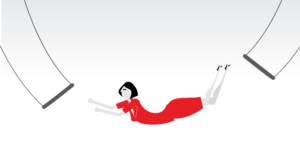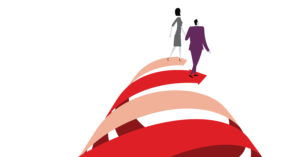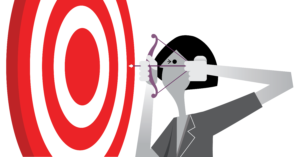To close out 2018, I’ve asked Dr. Andrea Simon, Vistage Speaker and corporate anthropologist, to write the following guest blog, “Why Do We Make Mistakes?”
This blog seemed a fitting conclusion to my recent series on habits.
We’ve all been told since childhood to learn from our mistakes. In this blog, Dr. Simon offers us her perspective on the science of making mistakes. We learn why making mistakes makes us smarter and our brains bigger. And why, despite our efforts to learn from them, we continue to make them throughout our lives.
See you in the new year.
Elisa K Spain
You can read more of my blogs and leadership quotes here.
***************************************************************************
Mistakes are a natural part of life – there is no way around that. There is no person, alive or dead, who hasn’t made any mistakes throughout their life. The most significant difference, however, is between those who can learn from their mistakes and those who can’t. We may try to even go as far as saying that the secret to success is knowing how to handle errors and failure by treating them as the foundation for future achievements. And the sooner people learn to do that, the better.
But before we can go into more detail about that, let’s take a look at why we make mistakes, in the first place. One of the primary reasons is that life is unpredictable, thus the phrase trial and error. None of us were handed a life guidebook on how to run our lives, and we need to make our way as we go along.
Hopefully, after a series of several mistakes, we begin to learn to stop repeating them. But by this logic, however, we should stop making more errors by the time we reach adulthood – which is not the case. The reason – life is unpredictable and filled with unknown variables. It is even more uncertain in the 21st century. Today’s world is nothing if not fast-paced and the many technological advancements made over the past two decades have seen to that.
It is for this reason why traditional business models are not as viable as they once were. Ironically enough, it would be more of a mistake in the conventional sense of the word, to keep doing things the same instead of employing a bit of trial and error as a means of finding better ways of doing things.
What Can Mistakes Teach Us?
At their core, mistakes teach us things. It is why mistakes are sometimes called life’s lessons. In other words, mistakes teach us how not to do things, and it is up to each of us to realize that. If we look at scientific research, the failure to prove something through an experiment is still regarded as a success since it shows how two things are not connected.
When scientific research can prove a connection, it provides us with some genuinely fascinating insight. Based on a study conducted by, Dr. Michael Kilgard and his team from the University of Texas at Dallas, it was revealed that our brain goes through some significant changes every time we err.
During the learning process, the brain starts compiling the information, and it becomes enlarged. Over time, it begins returning to its original size but keeps the new neural pathways that the mistake generated. In other words, making mistakes makes us smarter by creating more efficient synapses and fundamentally altered neurons.
Encouraging the Right Mistakes in the Workplace
Though it may seem counterintuitive at first, a business will only stand to gain if it encourages mistakes in the workplace. Do please keep in mind that we are not talking about errors that are a result of inattention to detail or sloppiness. We are, of course, talking about the kind of mistakes that are a result of calculated risks.
By embracing these mistakes, employees will gain the necessary confidence to try out new things and not feel bad when they don’t work out as planned. It’s important to remember that many marketers today are employing this strategy. They are continually trying out new ideas (trial and error), figuring out what works and what doesn’t, as a means of driving innovation and remain competitive in the market.
For better or worse, today’s technological revolution demands more mistakes to occur, otherwise risk becoming obsolete. Employ the same mentality on a business management level, not only marketing. Innovation has a sizable chance of happening, and employees are also happier as a consequence.
Nevertheless, making the transition from a company culture where mistakes were traditionally penalized to one that encourages them, does not happen overnight. So, what can be done to facilitate this change?
Leading by Example
In most cases, it’s not enough to send a company-wide memo telling employees that it’s okay to take more risks and that failure is accepted. Old habits die hard, after all, and your staff will be skeptical at first. To counteract this phenomenon, it’s advised that you lead by example.
It’s a generally accepted fact that employees will take most of their cues from their leaders, meaning that management needs to showcase the importance of trying out new solutions. This top-down shift in mentality will not only act as an example, but it will also show that it’s okay for others to do the same.
Encouraging Feedback and Transparency
Feedback and transparency will also play a crucial role in this transition. Your employees should feel comfortable to present their ideas and should not be ashamed of the mistakes that they may encounter along the way. You will quickly come to realize that when everyone feels comfortable to share their ideas and failures, efficiency also increases.
When people are not constrained by fear of shame, they will be more open with each other, which, in turn, leads to closer relationships and better overall communication. Likewise, the free exchange of ideas and mishaps also increases the chance of innovation.
Fast Failure
The concept of fast failure isn’t something new, but it is a product of the 21st century. The idea, in and of itself, is more of a state of mind than anything else. It is based on the idea that mistakes are natural and accepted. So, when they do happen, mistakes shouldn’t be taken to heart. When something doesn’t work as expected, you quickly learn from them and move on to the next idea.
The more efficient use of fast failure is by applying it on a micro level. So, instead of trying an entirely new idea, it’s better to break it up into smaller parts and brainstorm at every stage of the process. It increases the likelihood of success of the original idea while still making mistakes along the way.
Takeaway
The point is that mistakes have a lot to teach us as long as we are willing. The biggest hurdle, however, is to change the heavily entrenched idea that errors are a terrible thing and people should be reprimanded for them.



 The initial results of my Pivot are excellent. I feel I have much greater clarity regarding the next 3-5 years..
The initial results of my Pivot are excellent. I feel I have much greater clarity regarding the next 3-5 years.. 